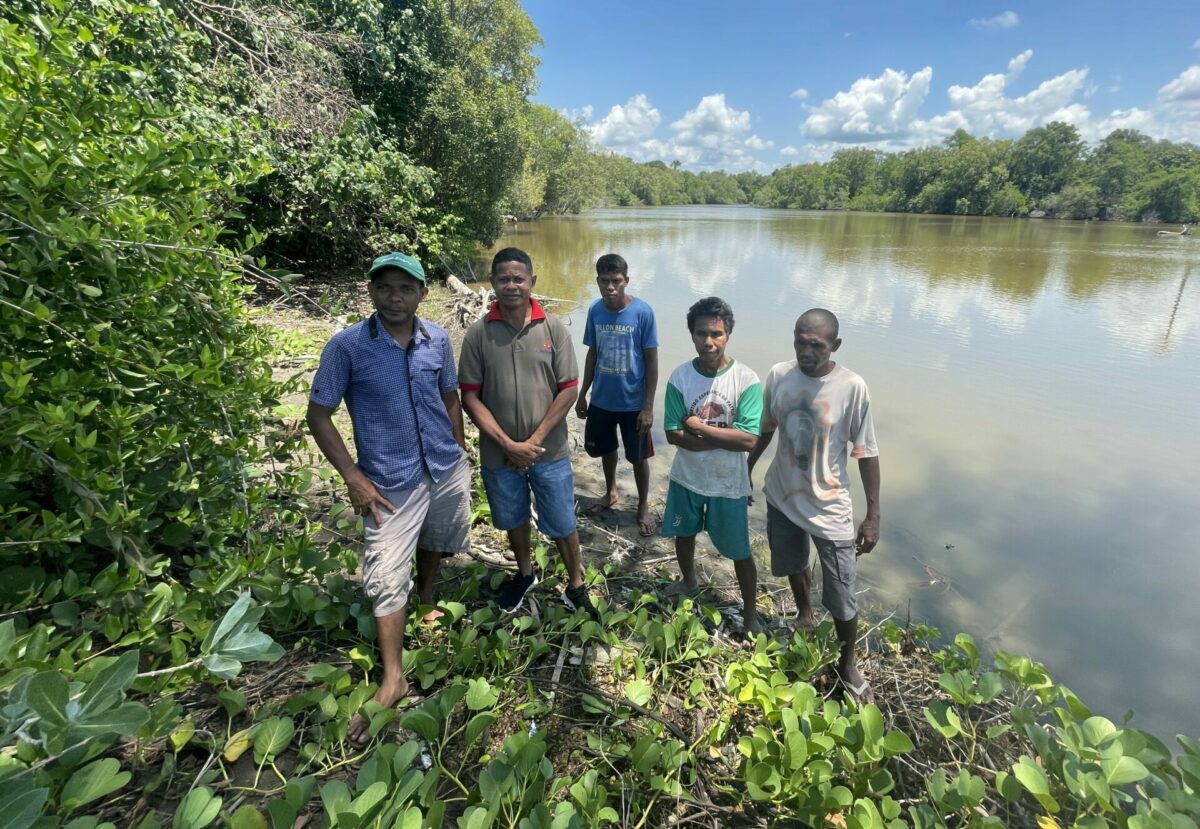Throughout generations, coastal and marine resources have been a lifeline for local communities, who have consistently employed sustainable and wise practices. This can be witnessed in Viqueque, Timor-Leste, one of the Arafura and Timor Seas Ecosystem Action Phase II (ATSEA-2) Project’s working areas. Their collective mission involved an in-depth exploration of the methods employed by these communities to balance nature conservation and cultural preservation while upholding local food security. For the many coastal communities whose livelihoods are intricately tied to the sea and coastal regions, the solution often lies in a well-established customary law known as Tara Bandu.
Rooted in generations of tradition, Tara Bandu is central to food security and the preservation of coastal ecosystems in Timor-Leste. This customary law was established through consensus between three sub-districts (sucos) located in the Lake We Ai-Foun area: Suco Bahalarawain, Suco Uma Uain Craic and Suco Uma Quic. This practice determines the timing of harvesting activities to protect the lake’s resources (including milkfish and shrimp) and maintain the ecological balance.
As part of Tara Bandu, it is forbidden to cut down any of the trees that surround the lake, as they help to prevent erosion. This measure is crucial for safeguarding the long-term sustainability of the area and the preservation of the coastal ecosystem. To ensure compliance with these regulations, monitoring and enforcement activities are carried out by a team that has been selected by the respective Suco leaders in Bahalarawain, Uma Uain Craic and Uma Quic.

Before Tara Bandu can be officially instated, a ceremonial event is held, during which pigs, buffaloes and chickens are sacrificed. After approximately three years, the harvesting activities are initiated, taking into account the collective observation and assessment of the lake’s resources. Responsibility for the lake and the implementation of Tara Bandu practices is shared equally among the ten villages within the three sucos, which include Bahalarawain, Uma Uain Craic, and Uma Quic.
Local communities in these sucos recognise the potential risks associated with exploiting natural resources, referred to locally as karma. This understanding reinforces their commitment to the principles of Tara Bandu, in order to maintain the sustainability of the lake and its surrounding ecosystem.
Prohibition periods are determined by heads of the community, who assess local ecosystem health to determine the appropriate duration of fallow periods and decide when the time is right to lift the restrictions. The community members conduct visual observations to set timings for opening the Tara Bandu harvesting. If there is a significant decline in the lake’s resources, the Suco leaders are informed to reconsider opening the harvesting activities.
During the harvesting period, communities focus on catching mud crabs and shrimps for daily consumption rather than commercial purposes. Depending on the skills of the individuals involved, the harvest can sustain households in Bahalarawain, Uma Uain Craic, Uma Quic and other nearby villages for up to three months. Typically, the harvesting period lasts for one week, with activities taking place throughout the day.
To support the local fisherfolk communities, organisations like the Ministry of Agriculture and Fisheries (MAF) of Timor-Leste, through the Arafura and Timor Seas Ecosystem Action Phase II (ATSEA-2) Project, have provided training in fishing gear and boat-marking; activities that help fisherfolk comply with regulations and gain official identification of their vessels. Once the boat is registered, they can access the necessary government support more easily. These training programs are designed to raise awareness among fisherfolk about the benefits of registering their boats and obtaining licenses.
The residents of Bahalarawain, Uma Uain Craic, Uma Quic and surrounding areas, such as Joao Pinto, rely on fishing, livestock farming and agriculture as their primary source of livelihoods. The training and capacity-building efforts provided by ATSEA-2 have not only improved their knowledge and skills, but also helped protect their interests and secure necessary licenses. As a result of the training, fisherfolk in these sucos have become more actively involved in the boat-marking program.
Tara Bandu is an important cultural and environmental practice in Timor-Leste. By promoting sustainable harvesting practices, these customary regulations support food security and contribute to the conservation of natural resources in and around Lake We Ai-Foun. Through training programs and collaborative efforts with government entities, the implementation of Tara Bandu has been further strengthened. Ultimately, this approach has contributed to the well-being of residents in these areas and the health of their surrounding environment.
By Stella Yovita Arya Puteri


